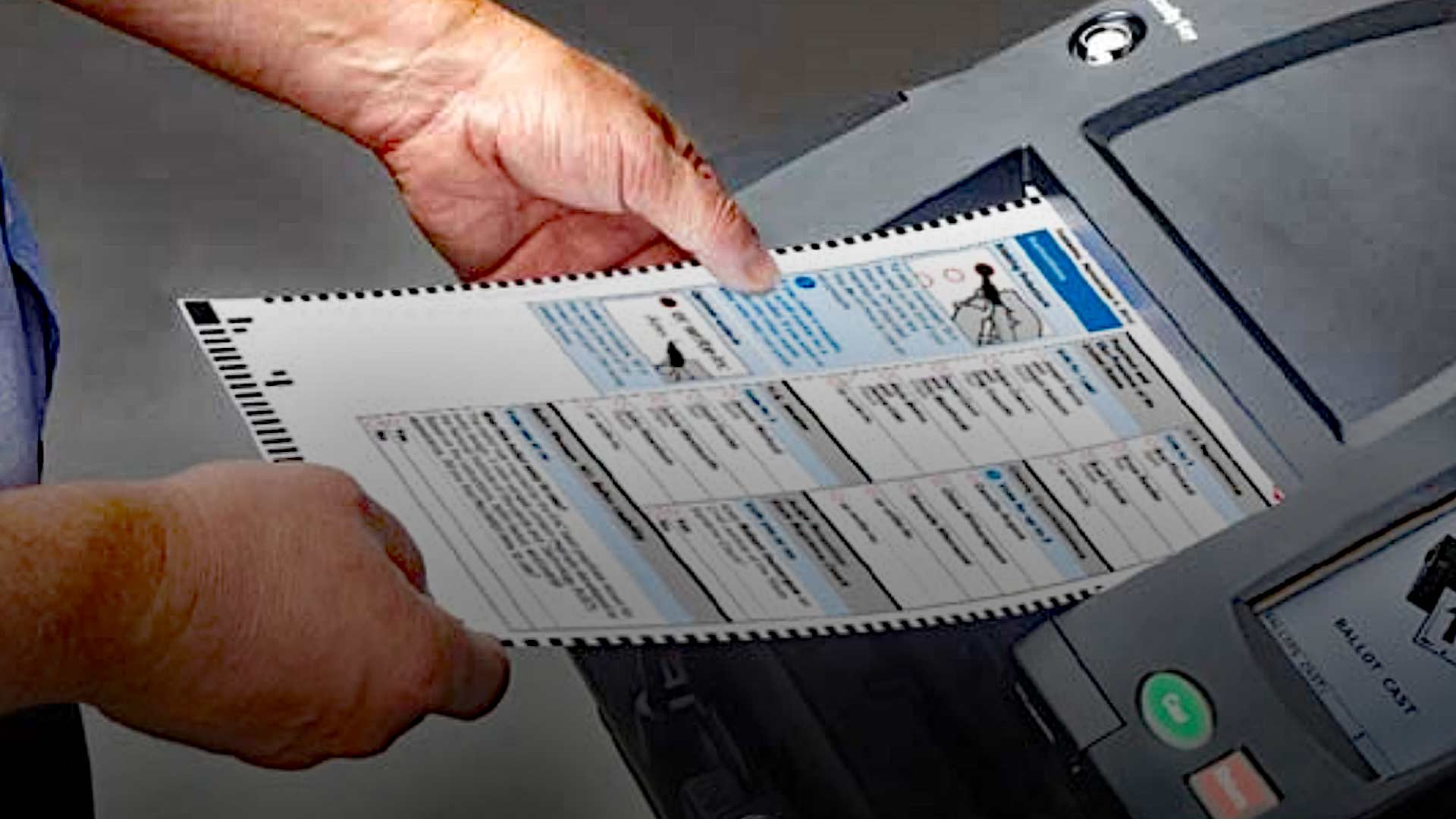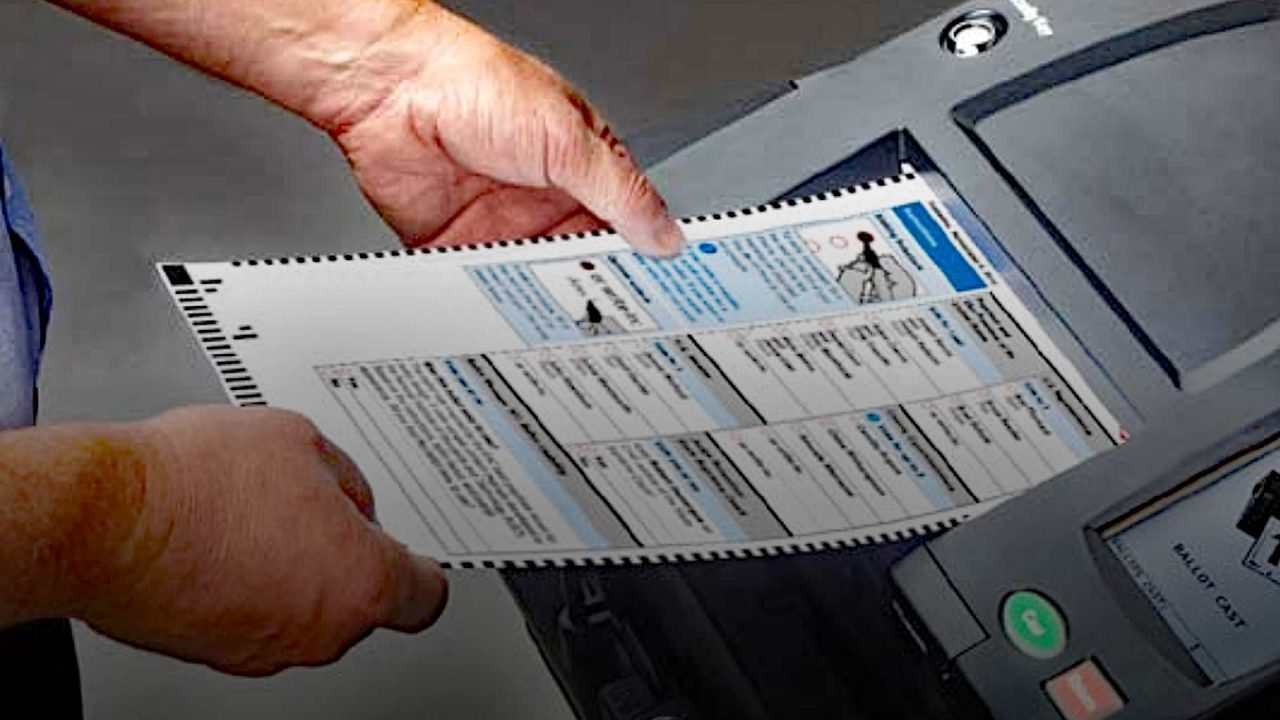
A coordinated group of Mat-Su residents attended the July 19 Mat-Su Borough Assembly meeting requesting that the borough become the first in Alaska to scrap all of its Dominion ballot tabulation machines.
In a string of about 25 testimonies that spanned an hour and a half, residents presented a long list of grievances regarding the security and reliability of Dominion machines, which are now used for state and local elections across Alaska and around the nation. A similar presentation was delivered to Gov. Mike Dunleavy and Lt. Gov. Kevin Meyer in the lead up to the 2020 election, warning the administration not to purchase or use Dominion machines. These pleas were ignored, however, with the state utilizing newly purchased Dominion machines for the 2020 election.
Testifiers at the recent borough assembly meeting included former assembly members, internet technology professionals, a state representative and a number of well-known and politically engaged residents.
Before the meeting began, assembly members were each given a packet that detailed most of the concerns raised during the lengthy public comment period. One file included a link to a video detailing the many ways in which electronic voting machines have been hacked across the nation.
Borough Assembly candidate Brian Endle, who has 20 years of experience working as a programmer and IT professional, laid out a series of questions that he said assembly members must be able to answer before ever holding another election using Dominion voting machines.
After arguing that the machines present multiple opportunities for bad actors to compromise an election, Endle asked whether assembly members knew for certain that the machines were free of malware from the moment they were tested, throughout the actual election, and during final tabulation. He also questioned if the assembly had ever verified whether Dominion machines were “actually not connected to the internet via any other device” during elections, which would allow for the manipulation of voting results.
Ultimately, Endle said paper ballots with video-recorded and televised hand-counts were the surest way to ensure election integrity.
Borough Clerk Lonnie R. McKechnie issued a statement last month in an effort to assuage mounting concerns with Dominion machines. She said the vote tabulators do not have wi-fi or Bluetooth.
The only way to test a compromised voting phase is with a hand count of paper ballots.
While acknowledging that Dominion machines contain thumb drive portals, which could be hooked up to phone lines for electronic transmissions, she said each machine has three serialized numbered locks to ensure that no tampering has taken place. McKechnie also stated that the borough never transmits election results electronically and does not use the machines’ thumb drive capacities.
Once each machine is returned from a local precinct to the borough clerk’s office, she said election results are calculated, in the presence of election officials, with memory cards from the machines. The memory card is then uploaded into the central count, which prints the precincts results and keeps an overall total of the election results.
Endle provided assembly members with his written response to the clerk’s statement, noting that while the clerk is accurate in saying tabulators are never connected to the internet, the machines are “accessible to the internet via the modem, cell tower and the equipment on the cell tower for a period of time.”
“Although it may not be the intent of the borough or even the state to transmit election results over the internet, the machines are at risk because the potential to intercept election results or distort them exists,” Endle explained.
Claims that the machines are not connected to the internet are a “common message used by Dominion and most other voting machine companies trying to assure voters of security,” he added. This type of assurance does not, however, “mention that a voting machine can connect to another device which is connected to the internet,” he observed.
“If we took these voting machines out, we would be iconic in Alaska.”
“Thus, the machine itself is not connected to the internet, but a secondary machine is, therefore transference of data between the Dominion machine through the other device to someone else on the internet is absolutely possible without the machine being directly ‘connected to the internet.’”
Endle also pointed out that pre-checking the machines before an election to ensure they tabulate correctly does not ensure they will be accurate on election day.
“It is a good policy to test a program before use, but these voting machines have different ‘phases’ they work in. Examples would be a set up phase, testing phase, and voting phase. If the voting phase was compromised and the test phase was not, your tests would appear correct, but your actual votes during the election or ‘voting phase’ would be different and you wouldn’t be able to tell,” Endle stated. “Are you certain that the voting phase was not compromised? The only way to test a compromised voting phase is with a hand count of paper ballots.”
Many of the other testifiers echoed Endle’s concerns.
Richard Stoffel pointed out that criticism of machine tabulation is bipartisan. He noted that Democrats have raised similar concerns, including the likes of U.S. Senators Elizabeth Warren and Amy Klobuchar.
ALASKA WATCHMAN DIRECT TO YOUR INBOX
State Rep. David Eastman said a lack of voter trust in elections may be responsible for the dismal voter turnout in Mat-Su elections. He pointed out that just 8% of registered voters bothered to cast a ballot in the most recent July 12 special election.
Former Mat-Su Borough Assemblyman Doyle Holmes, who served 11 years on the borough assembly, urged the current body to address the rights of voters to fair and secure elections.
“Your job is to protect the vote of the people,” he said, adding that “these machines can cause problems.”
Holmes cited two past instances in Talkeetna where machines broke down during elections.
Others maintained that hand counting ballots is feasible if the borough increases efforts to recruit election volunteers by reaching out to community groups and churches.
Sally Pollen, who has served as an election worker in past elections, implored the assembly to make the Mat-Su the “first place in the state that dumped the Dominion machines.”
Mat-Su resident Kathy Harris agreed.
“If we took these voting machines out, we would be iconic in Alaska,” she said.









17 Comments
AMEN!!! Great job Patriots….Meyer and Dunleavy ignored because they took the ZUCKERBURG money….treason!!!
How do we the public know whoever set up the machine in the first place didn’t tamper with it? Yes the locks might ensure after the fact.
This is a move in the right direction!. Paper ballots are the only secure method in our technological world. [from Fairbanks]
Agreed (from another Fairbanksian)
Yup, I agree. Only humans should be involved in vote tabulation, no machines. That would greatly decrease the chances of unobserved vote fraud.
Dear Luddites,
Before the Wright Bros. Man had Never known controlled flight. The technology exists!. Every vote can be accounted for the same way every Satoshi can be validated. The Blockchain! It’s understandable…even by this highschool dropout.
What is a satoshi?
A denomination of bitcoin. I think….
Agree 100%
Paper ballots
One vote in person with ID
Our only chance for fair and honest election is to junk the machines!! Saying my prayers that the decision makers are open and thoughtful!
Send the Dominion Machines to the Rage Rooms or Shooting Range.
Agree in person voting with valid picture ID.
Nickname the machines dunleavy, then kick them out the door
The assembly should put the machines in Big Lake to see if they sink or float.
Seems like we need to have another special election so people can vote on this important issue. I be willing to bet most people would vote to get rid of them.
Another reason to wish that I was alive back in the 1930’s….
I gave a testimony at the meeting that worked in multiple countries around the world as a National Security Analyst/Strategist with the military and US Government, and we made Security Assistance assessments after the votes in many countries were counted/tabulated by the countries Ranking Military General. Specific falsified elections were: 1. General Marcos, became dictator/president Marcos of the Philippines 2. General Tito, made himself president and dictator of Yugoslavia; when he died the region imploded and we had to intervene in Bosnia, Herzegovinian, Croatia, Albania and Kosovo. Peru was forcibly taken control by the Military, as well as Venezuela, Cuba, and multiple African nations…the most famous was General Idi Amin of Uganda. I also shared that I went to Ohio in late June, and they chose to do a mock election to determine if it could be done at the simplest/lowest level, in one day, without electronic machines. The individual I met was Tom Howard a precinct Captain. He explained there are 50 counties in Ohio, and each has approximately 12 precincts each. They voted, verified voters roles, signatures and IDs. The people voted, were counted, then tabulations and paper copies bagged and locked sent to the respective counties for their combined tabulation (which matched previous precinct counts), sealed in bags locked and sent by personnel from both parties to the Secretary of State. total tabulation and counts matched at every level. Providence of ballots was maintained, and transparency was observed. Vote was counted through each tier in one day. I was not involved in the voting, only received a briefing and report. I searched the internet and could not find anywhere that anyone could verify the Dominion Machines were “not” manipulated. Extensive evidence showing machine manipulation, ballot harvesting and lack of transparency on signatures, ballot addresses and address to voter roles and voter signature (or none) and multiple mis-counts were evident in nearly all states. I also provided an example of something I worked which directly affected our voting. After 9/11, the President by Executive Order stood up the Home Land Security (HLS) agency. Their first task was to write the nefarious Patriot Act. After approval by the President and approved by both Houses of Congress, their first task was to evaluate and list the National Security vulnerabilities. Number one was our electric, water, and gas infrastructure , Number two was our national elections, and I believe number three was our national ports (which now), many are owned by China. The list mentioned a few more. Then in 1993, Congress enacted the National Voter Registration Act of 1993. (also known as the NRVA and Motor Voter Act). It enhances open voter registration, with a drivers license, but the NRVA also allows the Department of Justice to bring civil actions in Federal Court to enforce it’s requirements. It gave the FEC dictatorial responsibility, rights to develop Federal Mail-in ballots, in essence 8 sections of Federal Rules and regulations. The states lost their Constitutional Authority once it was Federalized. What followed was 197 Integrity in Voter registration Act, 2002 Help America Voting Act (HAVA), 2007Democrat-led Congressional Committee on Voting Oversight and Governmental Reform; hearing, “Ensuring Fairness and Accuracy in Elections Involving Electronic Voting.” 2012 Establishment of the Electronic Registration Information Center. 2017 Department of Homeland Security (now DHS), designates US Election “systems” as part of the nation’s “critical infrastructure” DHS implements guidelines for no longer or non-sovereign states, that included forced electronic voting system buys, Federal Sector Coordinating Councils (SCC), electronic Infrastructure and Sharing Analysis Centers (EI-ISAC), and more Federal watchdogs required for network security and Vulnerability Assessment and /or remote penetration performed remote or offline by DHS (or 50 for profit vendors and multiple non-profit organizations). HOWEVER, the reports and findings are NOT AVAILABLE to the public. I’m running against Federal Over-reach, but more importantly, I want our sovereignty back in Alaska. Get the Feds dirty hands off our Natural Resources, our right to a free and transparent election, and their socialist Global Citizen- One World Government Agenda. I’m an American, I love my Country, my Alaska and as an American Patriot I will fight to save America… karl4senate.com
A one issue petition drive would get us the result we need to stop this machine insanity ! Volunteers ????